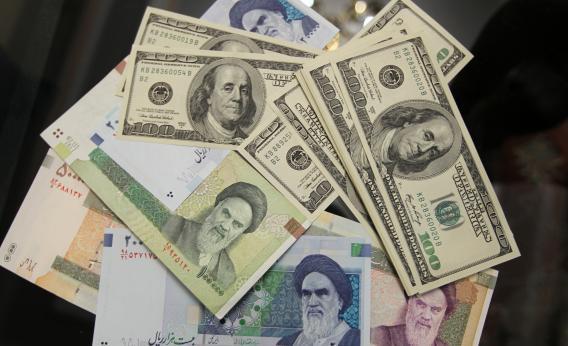How wonderful it must look from Riyadh: With Iran’s customer base crumbling under threat of U.S. legal action and EU sanctions, and the Iranian rial losing value faster than a Las Vegas condo, the “Kingdom” finds itself, once again, in an enviable situation.
Iran has responded to its self-inflicted isolation with its usual mix of bombast and economic mismanagement. In the past few days, since the EU voted in an effective ban on Iranian oil exports, the Iranian currency’s gradual decline became a bobsled ride, forcing the central bank to intervene and devalue the official rate from 9,000/USD to 12,600. This would be significant but not devastating if it were not for the fact that foreign hard currency has grown increasingly scarce—almost out of the reach of the Iranian middle class who depend on dollars, euros, and other foreign notes to purchase the small luxuries like electronics, vacations, and foreign educations that make life under the Mullahs almost bearable. In fact, according to Bloomberg, the actual black market rate for the rial plummeted to 23,000/USD. In effect, Iranians who had kept faith with their government and saved in the local currency just saw 80 percent of their nest egg disappear.
No wonder Iran’s rhetoric has sounded increasingly desperate and disjointed: On the one hand, in a great example of cutting off one’s nose to spite one’s face, Iran threatens to shut down Gulf shipping lanes and ban exports of oil to Europe; on the other, it has today offered to restart talks on its nuclear program.
Whichever path Iran takes, however, the Saudis can feel sanguine. After a year that saw some of the royal family’s closest allies vanquished by the Arab Spring and its ties with Washington strained anew over the GCC intervention in Bahrain, Saudi Arabia is suddenly the indispensible American ally once more.
Intolerant or not, the regime knows it is the only one in the world that can prevent the economic fallout from the showdown with Iran from becoming economically intolerable to the West (not to mention to China, Japan, and the rest of East Asia). The Saudi offer to make up for any shortfall in global supplies as result of actions by—or against—Iran was a prerequisite for making the sanctions strategy as pursued by the Obama administration viable. This gives the Saudis new influence in Washington. And, by my analysis at least, they’re in a win-win-win situation in the Gulf, too.
Sure, this new sanctions clampdown could all go badly wrong—at least from the view of those outside Saudi Arabia. But consider the fallout for the Saudis in a few of the more likely scenarios:
• Scenario 1: Iran loses the EU, Japan, and South Korea as markets for its oil, and the resulting scarcity in international markets a) raises prices and b) provides justification for near maximum capacity output by the Saudis and other OPEC states. Result: Capital flows to the Gulf from East Asia and the developed world.
• Scenario 2: Iran’s regime, feeling desperate, tries to block the Strait of Hormuz. The resulting spike in oil prices enriches Saudi Arabia as prices for oil already in en route (i.e., outside the Gulf) hit record levels. Further, the rash action alienates China, Japan, and India, who are dependent on Gulf supplies, and their voices are added to the calls for military action. The United States promptly obliges, and the Iranian nuclear program is set back grievously (if, indeed, the regime survives at all).
• Scenario 3: Serious unrest erupts inside Iran as savings erode and commerce grinds to a halt, with urban, liberal elites this time joined by the enormous merchant and trading class that had stuck with the regime to date. This, too, benefits the Saudis as Iran turns inward and the Gulf (i.e., GCC) huddles around Iran’s chief rival for protection. The Saudis, for all their innate fear of the Arab Spring’s implications, view monarchy as the more resilient way to weather such storms and have sold that fact hard ever since the Jasmine Revolution took out Tunisia’s secular dictatorship in late 2010. (To that point, not one “king” was overthrown this year; only in Bahrain was a serious challenge mounted to a monarchy, and after the GCC put down the unrest, the Bahraini monarchy enacted real reforms and ramped up subsidies, echoing moves taken by monarchs in Morocco, the Gulf emirates, Oman, and Jordan.)
Even a more-radical Scenario 4, whereby Israel finally strikes (something the Saudis have apparently been petitioning Allah for ever since Saddam’s demise), leaves the kingdom in relatively good shape. (Does anyone doubt they would grant overflight permission?) Happily, the ailing Iranian economy suggests that Obama has been right to push diplomacy over military force. The desperation of recent Iranian moves bear out the arguments of those who see, in Tehran, a rational actor interested more in self-preservation and holding onto power than in sewing nuclear Armageddon. It’s far too early to declare victory, but when the currency begins to collapse and oil revenue starts drying up, one way or another, the end is nigh.
Follow me on Twitter, subscribe to my Facebook feed, and preorder my book, “The Reckoning: Debt, Democracy and the Future of American Power,” coming in April from Palgrave Macmillan.
